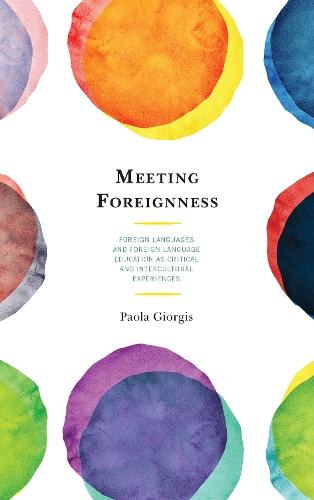
Meeting Foreignness: Foreign Languages and Foreign Language Education as Critical and Intercultural Experiences
(Hardback)
Available Formats
Publishing Details
Meeting Foreignness: Foreign Languages and Foreign Language Education as Critical and Intercultural Experiences
By (Author) Paola Giorgis
Bloomsbury Publishing PLC
Lexington Books
15th October 2018
United States
Classifications
Professional and Scholarly
Non Fiction
Language teaching and learning
Translation and language interpretation
418.0071
Physical Properties
Hardback
142
Width 158mm, Height 234mm, Spine 17mm
386g
Description
How is Foreignness defined by language Who has the power to define the foreigner as such, on which grounds, from which positioning, for which purposes And within such premises, which is the role of foreign languages in defining, or challenging, Foreignness This book reflects on the concept of Foreignness from a special lens, that of foreign languages and Foreign Language Education. Advancing that the experience of foreignness that foreign languages foreground opens up to a different apprehension of the self and the others, this work shows how such experience can problematize, question, and challenge meanings, assumptions, conceptualizations and representations ordinarily taken-for-granted, a much needed reflection at times when prevailing narratives essentialize individuals and groups according to their linguacultural backgrounds. Though with a global perspective, the book also addresses the Italian context in particular: after introducing a brief historical background, it examines how foreignness is addressed, portrayed, or questioned in contemporary socio-cultural and political debates, and presents practical activities to show how the foreign language can be used for intercultural purposes. An original interdisciplinary approach, combining Critical Linguistics, Foreign Language Education, Intercultural Studies, and Critical Pedagogies, together with works of literature and examples from several fields, integrates theoretical references, practices and research methodologies to take the reader within the complex and fascinating world of languages, displaying how they inform individual and collective identities and representations, and how they can both serve processes of manipulation and domination, as well as those of empowerment and emancipation. For its interdisciplinary and integrated approach, this book aims to address teachers, educators, scholars, practitioners, researchers, and students, but also those readers who are curious to know more about languages, and about how they shape our identities, our meanings and our lives.
Reviews
Paola Giorgis strength is praxis: she shows how to turn theoretical writings into informed applied choices. She presents the foreign language classroom as both a critical and an intercultural space as indeed it is. -- Wendy Leeds-Hurwitz, Director, Center for Intercultural Dialogue
Paola Giorgis combined the doggedness of the white truffle hunter and the deftness of the master cook to prepare this highly original intercultural and interdisciplinary reflection on foreign languages and Foreign Language Education. -- Jean-Marc Dewaele, Birkbeck, University of London
Paola Giorgis has created a written work of art bringing together contemporary ways of knowing within foreignness, interculturality, and linguistic diversity. Moving seamlessly between classroom, philosophy, and scholarship, Giorgis has given us an emancipatory praxis which understands power, communication, and context. -- Shirley R. Steinberg, The University of Calgary
Author Bio
Paola Giorgis teaches English language, literature and visual arts in Italian high schools and holds a PhD in anthropology of education and intercultural education. More info at: - https://centerforinterculturaldialogue.org/s=giorgis - http://researching-multilingually-at-borders.com/page_id=1818 - wom.an.ed - womens studies in anthropology and education www.womaned.org
